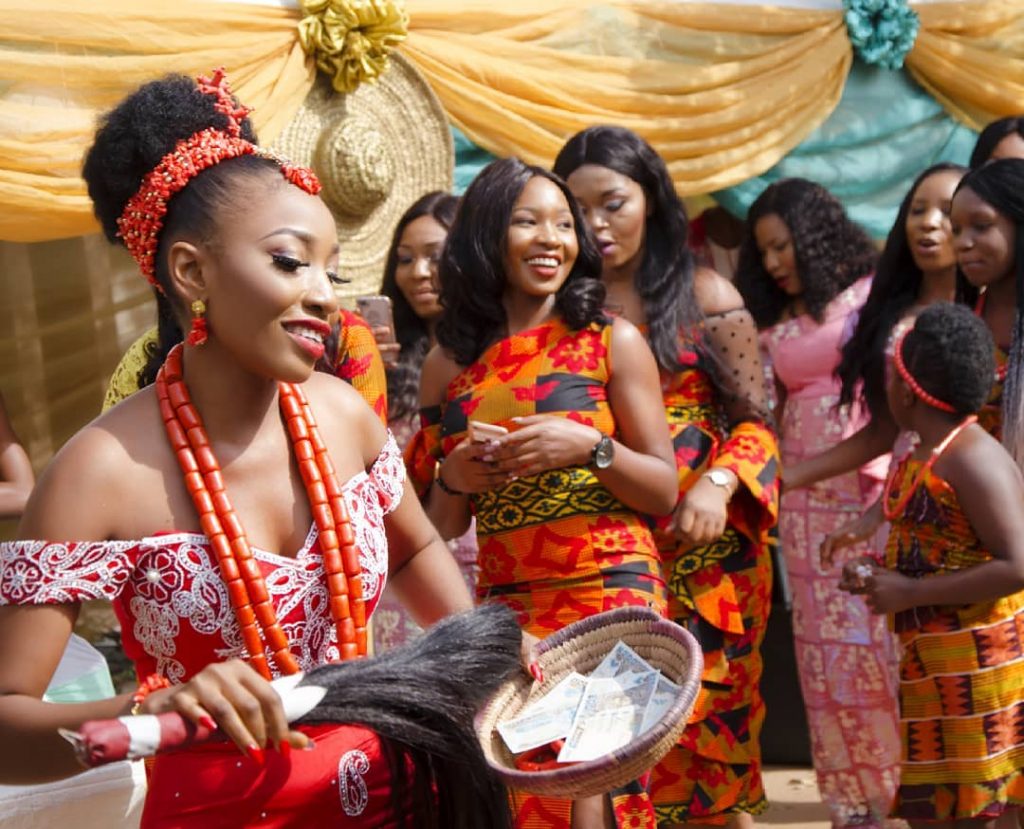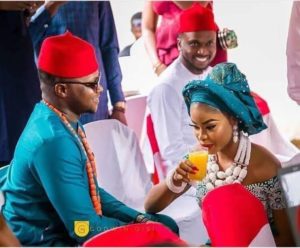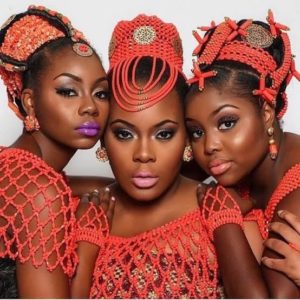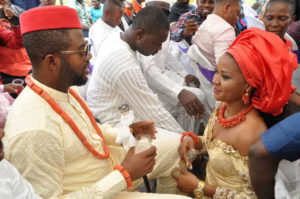
Everyone dreams of the day they will walk down the aisle with the flowers, music and it’s the first official step towards forever with your better half.
The Igbo people are located in West Africa in the eastern part of Nigeria. In this article we’ll talk about how they celebrate their traditional marriage.
Igbo Traditional Marriage
The igbo traditional engagement also known as Igba Nkwu ceremony is in stages. But before a man marries an Igbo woman, he must first ask for her hand in marriage, from her parents, as well as her umunna (her extended family, represented by the elders).
Stages of Igbo traditional marriage:
- Marriage Introduction (Inquiry ,Iku Aka or Iju Ese)
- Consent From Her Umunna/Extended Family
- The Dowry/Bride Price Payment (Ime Ego)
- Wine-Carrying Ceremony (Igba Nkwu Nwanyi).
The Introduction, Proposal/ Inquiry (Iku Aka or Iju Ese)
The Igbo translation of iku aka is “to knock on the door” and “Iju Ese” is translated as: “to ask about or inquire”. This is the very first visit of the groom-to-be to his prospective in-laws. Escorted by some members of his family, the would-be-groom makes an introductory visit and formally introduces himself and his family members to the bride-to-be’s family, officially makes known his intent to marry their daughter, and then “asks’ for the bride’s parents” consent.
The groom should not go alone for the “iku aka” visit – you are expected to be accompanied with your father and elderly relatives, plus a few close friends (optional). Here, the groom-to-be, accompanied by his parents and a small group of close family members (one or two uncles and aunts) visit the bride’s parents to officially announce his interest in marrying their daughter, and also asking the girl’s hand. His father or an elderly Uncle would be the spokesman at this visit.
When going for the “iku aka”, the groom is not expected to take any gift along, but you can use your discretion to take a few gifts .
Gifts like hot drinks , kolanuts, palm wine, alcoholic drinks or non-alcoholic wine on this initial visit to his future inlaws.
The bride may not be present during the “Iku Aka”, if she does not live with her parents. If she lives with her parents, she would be called in and asked for her own consent, and if her answer is “yes”, the gifts are accepted and shared there and then, and further visits would be scheduled. If not, the meeting would come to an end. If the bride-to-be lives far from her parents, her family will tell you that you will be contacted with the answer/response, whether a yes or no. If you receive a yes, you proceed to the “ime ego” stage.
After the visit, the bride’s family would usually send out representatives to go investigate the groom-to-be and his background, find out where he is from, what he does for a living, about his family any recurrences in his family history such as diseases, sicknesses, negative characters, fertility, history of divorce, level of responsibility of the men in that family and commitment to their wife and children etc. and any other important thing. The essence of this type of investigation is for the bride’s family to determine whether the would-be-groom is “capable” and responsible enough to take care of their daughter and future grand-children.
The groom family will also carry out the same investigation.
If the “Iku Aka” is positive, the groom with his family will receive a list of the other steps involved and an overview of the customary marriage requirements of the bride’s village this varies from one Igbo town to another.
During his introductory visit, the would-be-groom will visit the bride’s clan (her father’s people to inform them about your interest in marrying their daughter. This stage is very important because it is only when the groom-to-be receives the consent of distinct members of the bride’s extended family that dates for the traditional marriage rites and ceremony can be scheduled, and things would progress from there.
Here, the groom is expected to be accompanied with more people than the first visit (so, endure to not go alone to ask for her hand in marriage), take a few gifts along such as kola nuts, palm wine, beer, soft drinks, heads of tobacco and snuff and a goat.
After receiving the consent of the bride’s family as well as of her extended family, the groom can proceed to visit the bride’s family again, with his family members, to settle the bride price (ime ego). This money is totally a symbolic thing and not the real amount or value of the woman.
But before you make the “ime ego” visit, you need to ask your future in-laws for the customary engagement list of items to bring along – usually, ‘the engagement gifts list’. This is a customary list of things a groom should bring when asking to marry a bride, and the items in the list differs slightly from place to place in Igboland.
The “ime ego” (bride price/dowry) usually involves lengthy negotiations regarding the value of the wife-to-be, and sometimes there would be quarrels, disagreements and begging between both families.
The bride’s family usually starts “pricing” their daughter high by amplifying her accomplishments and virtues, and then the groom’s family would present a counter offer – pricing back and forth until both parties come to an agreement of a final amount/worth of the wife-to-be.
Once the dowry is paid, the groom’s family would discuss the date and plans for the traditional wedding (Igba Nkwu) ceremony day, before they depart.

The Igba nkwu is a major part of the Igbo traditional marriage rites that a groom performs at the bride’s family home, usually in her village, in the presence of her extended family, as well as his (the groom’s) close family. In the olden days, this was “the wedding” proper.
The “Igba Nkwu” ceremony is the formal traditional engagement plus customary wedding party and takes place in the bride’s father’s family compound, in her home town. The bride’s family caters and cooks assorted food for the groom’s family and guests. They also decorate their compound, and hire live bands or traditional dancers to entertain at the occasion.
The day of “Igba Nkwu” is traditionally, the formal “wedding day”, and it includes a party/celebration with invited friends and family, as the previous ceremonies are usually quiet, between very few family members.
The bride-to-be dresses up in the Igbo traditional attire for married women, that is blouse and wrapper with a red native coral beads with a flambouyant headtie (Ichafu).

During the “igba nkwu” ceremony, the groom is expected to be accompanied by his parents, more relatives and friends than he had during the preliminary marriage rites. The groom is expected to bring along the items in the igba nkwu list – he should have obtained this list from his in-laws during one of his introductory visits. This is a list of customary bridal gifts plus the dowry/ bride price that a groom must present before marrying an Igbo bride.
The highlight of the “igba nkwu” traditional marriage involves the bride publicly pointing the man she wants to marry to her and the groom’s family. This is how it happens: everyone is seated in groups – the groom is seated in the midst of his family members and friends. The bride’s father starts pronouncing marriage blessings on her and then gives her a cup/glass of palm wine to hand to the man that she agreed to marry. The groom would be hidden within the large crowd of attendees and the bride is required to search him out and offer him the drink while kneeling down. If he accepts and drinks, that signifies to the public that he is “the one”.

After the bride finds her groom and he drinks from the wine, blessings will be pronounced on the couple by their parents and there will be party and merriment, the couple are now man and wife.
Our next article will be talking about naming culture in Africa while you are anticipating the article read this eye opening article about Good and Evil.
Recent Comments